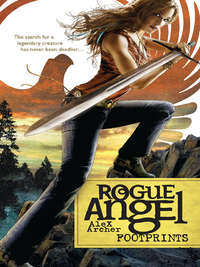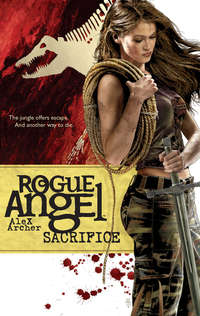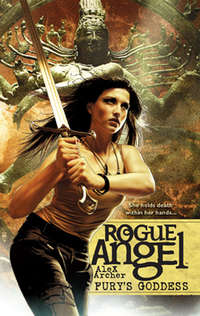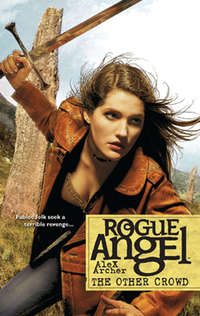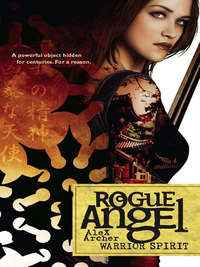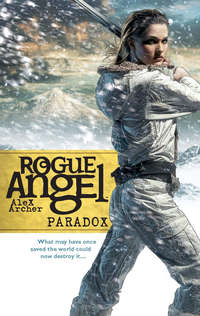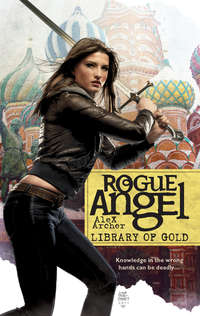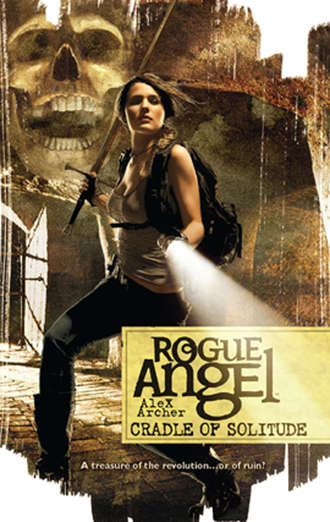
Полная версия
Cradle Of Solitude

“Do you have any idea why the thieves would be interested only in our Confederate friend’s remains?”
Annja frowned. “That’s all they took?”
“They were only interested in the skeleton and the documentation pertaining to it that you and Professor Reinhardt assembled. Nothing else was touched, including items of considerable value that were in plain view in Dr. Reinhardt’s office.”
That put an entirely different spin on things. Breaking and entering to steal museum pieces worth millions was one thing; doing so just to make off with the recently recovered remains of a Confederate captain no one even knew existed was another.
Her thoughts turned immediately to the shadowed figure she’d encountered in the catacombs the night before.
There was more going on here than she’d realized.
Cradle of Solitude
Rogue Angel™
Alex Archer

www.mirabooks.co.uk
THE LEGEND
…THE ENGLISH COMMANDER TOOK JOAN’S SWORD AND RAISED IT HIGH.
The broadsword, plain and unadorned, gleamed in the firelight. He put the tip against the ground and his foot at the center of the blade. The broadsword shattered, fragments falling into the mud. The crowd surged forward, peasant and soldier, and snatched the shards from the trampled mud. The commander tossed the hilt deep into the crowd. Smoke almost obscured Joan, but she continued praying till the end, until finally the flames climbed her body and she sagged against the restraints.
Joan of Arc died that fateful day in France, but her legend and sword are reborn….
Contents
Chapter 1
Chapter 2
Chapter 3
Chapter 4
Chapter 5
Chapter 6
Chapter 7
Chapter 8
Chapter 9
Chapter 10
Chapter 11
Chapter 12
Chapter 13
Chapter 14
Chapter 15
Chapter 16
Chapter 17
Chapter 18
Chapter 19
Chapter 20
Chapter 21
Chapter 22
Chapter 23
Chapter 24
Chapter 25
Chapter 26
Chapter 27
Chapter 28
Chapter 29
Chapter 30
Chapter 31
Chapter 32
Chapter 33
Chapter 34
Chapter 35
Chapter 36
Chapter 37
Chapter 38
Chapter 39
Chapter 40
1
Richmond, Virginia
April 2, 1865
The choir had just begun the “Hallelujah” chorus when the door to the church flew open with a bang. Confederate President Jefferson Davis, seated at the front of the church next to his wife, Varina, turned and watched as a man raced down the center aisle toward him.
That he had come from the front lines was obvious; his face and hands were covered with dirt and soot, while his uniform looked as if it hadn’t been washed in a month. A bloodstained scrap of bandage encircled his head just below the hairline, but since it didn’t seem to slow him, Davis guessed that the wound it covered was at least a few days old. Rank insignia on his uniform indicated the man was a captain, though Davis couldn’t remember the man’s name.
Reaching him, the soldier leaned against the end of the pew, took a moment to catch his breath and then stammered, “G-G-General Lee’s line at Petersburg has broken, sir, and he intends to fall back and evacuate the city immediately.”
Shocked murmurs erupted as those within earshot repeated what was said to those around them. Even the Episcopalian minister presiding over the day’s worship services came down from his lofty perch on the pulpit to hear the news.
Davis ignored everyone but the messenger.
“How long can Lee hold them, Captain?”
The man shook his head. “Not long, sir. He bid me to urge you to hurry. He can give you a few hours, but expects that the enemy will be inside the city limits by nightfall.”
Nightfall. That gave them five, maybe six hours at most. If they were going to get the government out of Richmond, never mind save what was left of the treasury, they had to get started immediately.
“Convey my regards to General Lee and tell him that we will execute our retreat plan. Godspeed, Captain.”
As the messenger hurried from the church, Davis turned to his wife and made his apologies. There was no way he could sit through the service now, not with the evacuation of the entire city to plan and carry out in less than half a dozen hours. He caught the eye of his aide-de-camp and the two of them rose and rushed down the aisle.
Time was of the essence and Davis didn’t intend to waste any of it.
Fifteen minutes later the president was ensconced with the vice president and several members of his cabinet in the living room of the house on the corner of Twelfth and K streets that served as both the executive mansion and his family residence. An evacuation plan had not been established, for neither Davis nor any of the other members of his administration had foreseen the fall of the city. The rest of the day would be spent trying to correct that oversight. The executive mansion held thousands of documents that might give the Union a leg up in their push to destroy the Confederacy and aides were immediately set to the task of burning as many of them as possible. The vast warehouses of stockpiled supplies also had to be dealt with, for to allow them to fall into Union hands and be used against the very soldiers they had been intended for was completely unacceptable. Orders were given to deal with the problem. Perishable foodstuffs would be given away free of charge until sundown to any who arrived at the warehouses to claim them. The casks of rum and other liquors would be smashed open and poured out in the streets, to keep the public from indulging in a drunken frenzy when they most needed to keep steady heads on their shoulders. But it was the order to burn the tobacco warehouses that pained Davis the most, for the crop inside them represented the future for so many of the citizens he had sworn to protect. Losing their harvest would be devastating.
Of course, it paled in comparison to losing their homes. But at least he would do what he could to see that as many of them escaped ahead of the Union Army as was possible.
Lee was just going to have to hold on.
The night loomed ahead of them, growing more threatening by the minute.
THE TRAIN WAS LATE.
Captain William Parker sat astride his horse near the end of the platform and stared worriedly down the tracks into the darkness. He could hear the Union guns in the distance, shelling Lee’s lines, and he knew it wouldn’t be long before the order was given for the retreat. The general could only hold out so long and he was already well beyond the time frame he’d given the president. Soon the front would fall, the Confederate troops would retreat through the city streets, and Richmond would fall into Union hands. When that happened, the chances of getting out of the city at all, never mind getting out with their cargo intact, would shrink considerably.
Where the hell is that train?
He turned and looked back at the squad of men he’d commandeered to help him carry out his mission, shaking his head at the sight. With every able-bodied soldier doing their damnedest to keep the Yanks from entering the city limits, he’d been forced to make do with a group of midshipmen off the Patrick Henry, the thirteen-hundred-ton side-wheel gunboat he’d converted into a floating school for the Navy. Some of the “men” in his command weren’t more than twelve years old!
God help me. How am I supposed to guard the treasury with schoolboys?
Thankfully, the plan was simple enough. A single rail line still stood open between Richmond and Danville. With two trains at their disposal, President Davis and his staff would be on the first one out, with Parker and his special cargo following in the other. Once in Danville, they’d go their separate ways.
Parker had no illusions as to why he and his cargo—about seven hundred thousand dollars worth of gold ingots, gold coins, silver bricks and Mexican silver dollars—were on the second train. If things became difficult farther down the tracks, the unspoken hope was that the Union soldiers would be more interested in the treasure than in securing the president, thereby allowing Davis to evade capture and escape.
It was a good backup plan, made better by the fact that it actually had some hope of success, and Parker approved of it despite the risk to himself and those under his command. The Confederacy might be able to replace the treasury, but it wouldn’t recover from the capture of its beloved president.
A glance at his pocket watch told him that it was past eleven. The fact that they’d made it this late in the night without being overrun by the enemy was another of General Lee’s miracles. He’d dug in just outside the city and withstood charge after charge, buying them the time they needed, doggedly determined to keep the Yanks off the streets of the capital as long as possible. Lee’s predicated deadline of nightfall had come and gone and still the Army of Northern Virginia held out. Parker didn’t know how he did it; he was just thankful they had a man like Lee on their side.
But even Lee could not keep it up much longer.
A rumbling sound broke his reverie and he looked up to see the locomotive coming down the tracks toward them, smoke pouring from its stack. His feelings of relief quickly turned to concern, however, when the engine drew closer and he saw the condition of the train.
Getting here hadn’t been easy, it seemed. Great dents marred the smooth curve of the boiler and the sides of the cab had been shot full of holes. The roof of the tender had been torn away entirely, most likely the result of a well-placed cannon shot, and the engineer manning the coal shovel had a bloody bandage wrapped around his head and covering one side of his face. The cars beyond hadn’t fared much better.
The train had already slowed considerably by the time it reached Parker and he watched it roll on and continue for a few more yards before coming to a stop with the hiss of brakes and a cloud of steam. No sooner had it done so than Army officers swarmed inside, checking it over. When the okay signal was given the boarding began, starting first with the president and his cabinet, followed by what was left of their staff.
Parker didn’t have time to watch the parade, however, for the second train arrived on the heels of the first and he had work to do.
“Quickly now!” he shouted to the boys in his command and they snapped to, unloading the heavy chests from the wagons and carrying them aboard the train, stacking them against the rear wall of the car to which they’d been assigned.
Halfway through the job one of the midshipmen stumbled, dropping the sack he carried and spilling silver coins over the edge of the platform onto the tracks below.
Parker grabbed the boy as he readied himself to climb down and retrieve them.
“No time, son,” Parker said. “Some lucky fool will no doubt pick them up, but it’s not going to be you or me. Back to work now.”
It took them just shy of an hour, but at last all of the cargo was loaded and the rest of the cars were filled with as many of the people fleeing the city as they could possibly pack into them. Parker gave up his seat to another passenger, finding a place on the roof of the car alongside his second in command, Lieutenant Jonathan Sykes, and two midshipmen whose names he couldn’t dredge up from memory in his exhausted state.
No sooner had he settled himself onto the roof of the car than the train lurched into motion without warning, the usual whistle being dispensed with so as not to alert the enemy to their escape. The train moved slowly at first, sluggishly pulling away from the platform, and Parker found himself silently urging it on, as if his thoughts could somehow propel the train faster down the tracks.
Refugees lined either side of the tracks, moving forward through the darkness like the wandering tribes of Israel headed for the promised land. Parker was thankful it was too dark to see their faces, for his own despair and dismay were enough for him; he didn’t need to witness anyone else’s.
As they rolled across the bridge at the city limits, Sykes suddenly shouted, “Look!”
Parker followed his pointing finger back toward Richmond and saw an angry red glow lighting the sky. The thunder of distant explosions reached his ears as the glow grew brighter, spreading across the horizon.
Richmond was aflame.
“Damn Yanks have fired the city!” One of the midshipmen cursed.
Parker knew better, but he didn’t bother correcting the young man. Morale was bad enough; the men in his command didn’t need to know that the fire was the result of a direct order from the president, designed to ensure that nothing of value would be left for the Union troops to use against them. The warehouses along the waterfront had been full of powder and shot, too much to be moved swiftly, and rather than allowing it to fall into the hands of the enemy, Davis had ordered the entire lot to be set alight.
With the skyline glowing brightly behind him and the enemy’s guns echoing in the distance, Parker set his gaze forward and settled in for the ride.
2
It was only one hundred and forty miles from Richmond to Danville but the slow-moving train, overburdened as it was with excess cargo and the need to constantly stop and repair the track in front of it, required the night and most of the day to get there. A light rain was falling as they pulled into the station, but Parker was so tired that he barely even noticed.
The president’s party had come and gone by that time, but orders had been given and four wagons were waiting alongside the platform, guarded by a pair of infantrymen. They approached as Parker disembarked and one of the men handed him a folded piece of paper.
The note was from George Trenholm, secretary of the Treasury, ordering Parker to use any and all means necessary to evade the Union troops in the area and see his cargo safely to the old U.S. Mint in Charlotte, North Carolina. It also let Parker know that the Union cavalry had been spotted in the area and that he was to avoid contact wherever and whenever possible.
Parker laughed aloud upon seeing the final order.
What does he think I’m going to do? Stage an attack on General Sheridan’s cavalry column with a handful of midshipmen and half a dozen muskets?
The very notion was absurd. Still, these were desperate times and Parker had little doubt there would be some in his position who might just be daring enough to do something like that. Sometimes a bold move at just the right moment…
He shied away from the thought, before he could be tempted. Glory be damned, he told himself. Get the treasury to Charlotte. That’s the goal.
But Charlotte was a long way off and the chances of meeting the Union cavalry on the main road seemed pretty high. Sticking to the lesser known byways and backcountry roads would decrease his chances of running into the enemy but it would also slow him down.
Opt for speed and take the main road, praying they didn’t run into anything they couldn’t handle, or take the slower, surer route and chance arriving too late to do any good with the money they had in their care?
It was a difficult choice and one that needed some thought.
Concerned that a wagon train full of bulging money sacks and wooden chests stamped with the words Richmond Loan and Trust would be too tempting a target, Parker sent his men out to scavenge for containers they might use to hide the contents of their true cargo. It took well over two hours to make the switch, but when they were finished the treasure was hidden in barrels and crates that had once held sugar, flour, tea and other consumables. With the lids hammered tight, there was nothing to tell the casual observer that the financial future of the Confederation was contained within.
By the time the wagons were loaded and the men ready to head out, Parker had made his decision.
The money they carried was needed to keep the regiments in the field equipped with enough food, powder and shot to continue operating, never mind being able to pay the men for their service. They’d take the fast road and hope they arrived in time to do some good with the cargo entrusted to them.
They were in decent spirits when they left Danville behind, despite the steady rain. Parker, Sykes and one of the midshipmen, Daniels, were in the lead wagon, while the other men were split evenly among the rest. They kept a tight formation and managed to make decent progress for the first hour, covering nearly ten miles, but then the weather took a turn for the worse. What had started as a light drizzle turned into a downpour, soaking the men to the bone and turning the road into little more than a muddy track. It became difficult to see that the horses pulling each wagon were tied to the back of the one before them, ensuring that none of them fell behind and got lost.
They barely managed another mile during their second hour on the road and Parker was starting to consider where they might find a place to hole up for the rest of the night when they were confronted by several figures who suddenly loomed out of the rain ahead as they rounded a bend in the road.
“Whoa!” Parker cried, and pulled up quickly on the reins, stopping them a few dozen yards apart.
At this distance it was hard to see anything for certain, but Parker thought there were at least a dozen men in the party ahead them. Three or four on horseback, it seemed, and another ten or so on foot.
They weren’t significantly outnumbered, which was good, but given the level of experience of the men under his command, even that wouldn’t be too much of a blessing.
He glanced at Sykes. The other man held his musket lightly, the muzzle pointed forward. Not enough to be overtly threatening, but ready to be used if things went south.
Sykes must have sensed his attention, for he turned his head and gave Parker a slight nod, letting him know he was ready for whatever was to come.
He was a good man, Parker thought.
Before Parker could do anything, however, one of the riders ahead kicked his horse into motion. Parker let him close half the distance between them and then shouted, “That’s far enough. Identify yourself or my men will open fire!”
The rider pulled his horse up short.
“Easy, Captain,” the man called out. “Didn’t mean to startle you.”
Parker knew the voice, but sheer surprise kept him from responding right away, and while he struggled to find his voice the other man unveiled the lantern in his free hand, letting the light fall upon him.
Even through the downpour Parker recognized the face of their benefactor, secretary of the Treasury, George Trenholm.
Still, Parker was cautious. “Be ready for anything,” he told Sykes as he handed over the reigns. “If this looks like a trap, get the wagons out of here as best you’re able.”
Sykes never took his eyes off the men ahead of them. “You can count on me, sir.”
Parker climbed down from the wagon and walked forward to where Secretary Trenholm was waiting for him. As he drew closer the other man dismounted, as well, which helped put Parker at ease.
Trenholm extended his hand and the two men shook.
“Good to see you, Captain. I was starting to think we’d missed you.”
“The rain, sir. You know how it gets.”
Parker didn’t know much about Secretary Trenholm’s history, but it seemed a safe bet that the man had never had to lead a wagon train through a torrential downpour. Trenholm came from money, and old money at that.
But war has a way of leveling social classes, Parker knew, and he found it mildly ironic that the two of them were to meet here, in the midst of a muddy track that could barely be called a road, the rain beating down on both their heads with equal abandon.
Oblivious to his subordinate’s thoughts, Trenholm went on. “There’s been a change of plans, Captain. I’m to escort you to an important meeting where you will receive your new orders. If you would come with me…”
Parker frowned. “My men, sir?”
“About a hundred yards up the road there’s a place where they can get off the main thoroughfare and wait for your return. I’ll leave several of my own men to stand guard with them. On a night like tonight, I doubt they’ll run into any difficulties.”
Trenholm was probably right, but that didn’t make Parker feel any better about leaving his men in the middle of nowhere, particularly given their level of inexperience. Still, an order was an order.
“Yes, sir. Give me a moment to explain the situation.”
He returned to Sykes and let him know what was going on. The young lieutenant wasn’t thrilled with the situation, either, but there was very little that they could do about it. Parker ordered him to keep his eyes open and wait for his return.
One of Trenholm’s men loaned him a horse and five minutes later they were under way. Trenholm led him a mile or so through the woods on a narrow track that was little better than a game trail really, until they came to a clearing. Parker could see that several campaign tents had been erected there and men in Confederate uniforms were moving about.
Trenholm took him to a larger tent set slightly off from the others and asked him to wait inside.
“Someone will be along shortly to give you further instructions.”
Ever the dutiful soldier, Parker complied.
He found the tent was sparsely furnished, with just a pair of camp chairs on either side of a makeshift table made from a few scraps of wood and a blanket-covered cot off to one side. It was warm inside, thanks to a camp stove that was burning in the far corner, and Parker soon found himself literally steaming as the heat sucked the moisture out of his clothes.
He didn’t mind. Being out of the rain, even if only for a few minutes, was a welcome relief.
When, after fifteen minutes, no one had yet arrived to deliver his new orders, he dragged one of the camp chairs closer to the stove and sat down.
I’ll take a few minutes of rest, that’s all, he thought.
He must have dozed off, however, for he came awake with a start when he heard someone enter the tent behind him. He leaped to his feet and spun about.
He didn’t know who he expected to see waiting there for him, but President Jefferson Davis himself was not on his list of possibilities.
So surprised was he that for several long moments all he could do was stand and stare. The president didn’t seem to notice.
“Thank you for coming so quickly, Captain,” he said as he laid the books and papers he was carrying on the desk and hung his coat on the back of the other chair before dragging it closer to the stove. “Please, sit down.”
Parker nodded, then found his voice at last as he waited for Davis to sit down before doing so himself. “Thank you, Mr. President.”
“Don’t thank me yet,” Davis said, his expression darkening at some private thought. “Not until you’ve heard why I’ve called you here, at any rate.”
An aide came in bearing two glasses of brandy on a tray. He gave one to the president, then offered the other to Parker.
Drink in hand, President Davis turned to him and said, “I have a very special assignment for you, Captain.”
3
Paris, France
Present day


